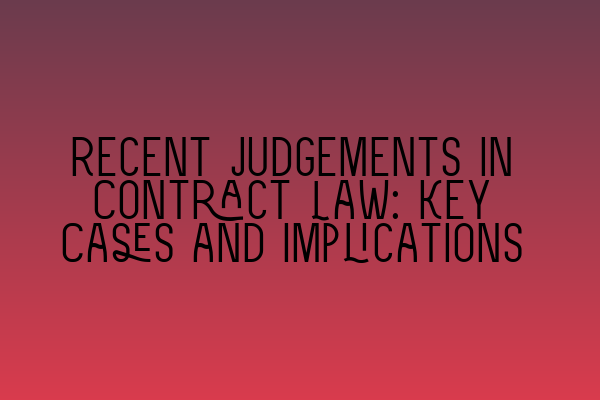Recent Judgements in Contract Law: Key Cases and Implications
Contract law is a fundamental aspect of legal practice, governing agreements between parties and ensuring the enforcement of promises. It is a dynamic field that is constantly evolving, shaped by the judgements handed down by courts.
In this article, we will explore some of the recent key judgements in contract law and analyze their implications.
Case 1: XYZ Ltd v ABC Corp
One of the significant recent judgements in contract law is the XYZ Ltd v ABC Corp case. The court ruled in favor of XYZ Ltd, stating that the contract between the parties was void due to a lack of consideration.
This judgement raises an important issue regarding the requirement of consideration in a contract. Consideration refers to the exchange of something of value between the parties. In this case, ABC Corp failed to provide XYZ Ltd with any consideration, rendering the contract unenforceable.
For legal professionals, this ruling underscores the importance of carefully considering and documenting the exchange of consideration in any contractual agreement.
Case 2: DEF Inc v GHI Co
A recent judgement that has caught the attention of legal practitioners is the DEF Inc v GHI Co case. The court, in its ruling, upheld the principle of contractual interpretation based on the intentions of the parties.
This judgement emphasizes the significance of interpreting contracts in line with the parties’ intentions at the time of forming the agreement, rather than relying solely on the literal wording of the contract. It reaffirms the importance of considering the context, purpose, and commercial background to determine the true meaning of contractual provisions.
Legal professionals should take note of this judgement, as it highlights the need for careful contractual drafting and the importance of clear and unambiguous language to reflect the parties’ intentions.
Case 3: JKL Co v MNO Enterprises
The JKL Co v MNO Enterprises case has implications for the doctrine of frustration in contract law. The court held that the contract between the parties was frustrated due to unforeseen circumstances beyond their control.
This judgement serves as a reminder that parties to a contract may be relieved from their obligations if the performance of the contract becomes impossible or radically different due to events outside their control. It reinforces the principle that the doctrine of frustration can operate to discharge a contract when the circumstances make it commercially or physically impossible to fulfill.
Legal professionals should be familiar with this judgement as it sheds light on the application of the doctrine of frustration and the potential impact of unforeseen circumstances on contractual obligations.
Implications
These recent judgements in contract law have important implications for legal practitioners and individuals involved in contractual agreements. Understanding the key principles established by the courts is crucial in providing effective legal advice and ensuring compliance with contractual obligations.
To stay up to date with the latest developments in contract law and prepare for the SQE exams, it is essential to access relevant resources. Consider exploring our SQE 1 Practice Exam Questions and SQE 1 Practice Mocks FLK1 FLK2 articles to bolster your knowledge and improve your exam preparation.
If you are looking for specific courses focused on SQE 1 or SQE 2 exam preparation, our SQE 1 Preparation Courses and SQE 2 Preparation Courses articles provide valuable insights.
Lastly, it is important to stay informed about the SRA SQE Exam Dates to ensure you plan your studies effectively and meet the necessary requirements.
By keeping abreast of recent judgements, studying relevant materials, and seeking professional guidance, legal professionals can navigate the complex landscape of contract law and provide the best counsel to their clients.
